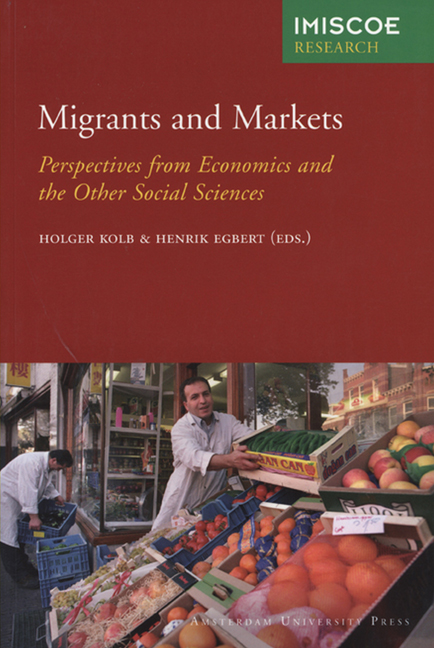Book contents
- Frontmatter
- Contents
- Introduction: Migrants and Markets: Perspectives from Economics and the Other Social Sciences
- The Impact of Immigration on the Labour Market: A Survey
- Investigating the Economic Impact of Immigration on the Host Country: The Case of Norway
- The Exit Option of Labour Migration from East to West Germany: Individual and Contextual Determinants of Unemployed Workers’ Geographic Mobility
- How Recent Amendments in German Immigration Law Affect Decisions: The Case of Polish Doctors
- Educational Selectivity and Labour Market Attainment of Jewish Immigrants from the Former Soviet Union in Israel and Germany in the 1990s
- States as Clubs? The Political Economy of State Membership
- Chinese Student Migration in Europe: A Migration That Nobody Objects To?
- Assessing Interdependencies between Sector Structures and Labour Migration: A Comparative Study of the British and the German Health Sectors
- Workers’ Remittances and International Risk Sharing
- Skills and Remittances: The Case of Afghan, Egyptian and Serbian Immigrants in Germany
- The Impact of Migration on Foreign Trade in Bolivia
- List of Contributors
- Other IMISCOE Titles
Educational Selectivity and Labour Market Attainment of Jewish Immigrants from the Former Soviet Union in Israel and Germany in the 1990s
Published online by Cambridge University Press: 02 February 2021
- Frontmatter
- Contents
- Introduction: Migrants and Markets: Perspectives from Economics and the Other Social Sciences
- The Impact of Immigration on the Labour Market: A Survey
- Investigating the Economic Impact of Immigration on the Host Country: The Case of Norway
- The Exit Option of Labour Migration from East to West Germany: Individual and Contextual Determinants of Unemployed Workers’ Geographic Mobility
- How Recent Amendments in German Immigration Law Affect Decisions: The Case of Polish Doctors
- Educational Selectivity and Labour Market Attainment of Jewish Immigrants from the Former Soviet Union in Israel and Germany in the 1990s
- States as Clubs? The Political Economy of State Membership
- Chinese Student Migration in Europe: A Migration That Nobody Objects To?
- Assessing Interdependencies between Sector Structures and Labour Migration: A Comparative Study of the British and the German Health Sectors
- Workers’ Remittances and International Risk Sharing
- Skills and Remittances: The Case of Afghan, Egyptian and Serbian Immigrants in Germany
- The Impact of Migration on Foreign Trade in Bolivia
- List of Contributors
- Other IMISCOE Titles
Summary
Introduction
Since the breakdown of the Soviet Union in the late 1980s, about 1.5 million Jewish emigrants left the country to various destinations in Western Europe, North America, and Israel. The vast majority of them (about one million) headed to Israel, which declared its aim to admit as many Jewish immigrants as possible irrespective of their socio-demographic background (Cohen 2002). Moreover, the Israeli government actively attracted and assisted immigrants from the former Soviet Union (FSU) to immigrate to Israel. However, almost as soon as the Jewish exodus from the FSU began, Germany declared its willingness to accept Jewish immigrants from the former Soviet Union. Thereafter about 200,000 Jews from the FSU and their family members, including non-Jews, entered Germany as refugees, an option available to all FSU Jews. The proportion of FSU emigrants heading to Germany has been steadily growing throughout the 1990s. In 2002 Germany accepted more FSU Jewish immigrants than any other country, including Israel.
This paper explores the labour market situation of Jewish immigrants from the FSU in Israel and in Germany during the 1990s. The unique circumstances of Jewish immigration from the FSU to Germany and Israel in the past fifteen years, where immigrants were granted practically free entry to both countries, enable us to conduct a rigorous comparison of patterns of immigrants’ economic integration. The comparison of Jewish immigrants in both countries allows us, first, to analyse patterns of immigrant self-selection to each of the destination countries, and, second, to reveal how receiving societies’ structural and institutional characteristics affect immigrant labour market attainment. In particular, we explore the role of immigration policies, including public assistance and settlement programs, as well as labour market structures for immigrant labour market chances in host societies (Reitz 1998, 2003; Freeman Ögelman 2000; Kogan 2003).
In the following section we describe the Israeli and German settings, in particular, immigration policies and labour market structures channelling labour market careers of FSU Jewish immigrants, as well as education-job linkages and ensuing returns on education acquired abroad. In section three we develop hypotheses regarding selectivity patterns and labour market integration, especially for the differential effects of immigrant status and education. Section four presents the data, section five the results, and the last section discusses the main findings and their implications.
- Type
- Chapter
- Information
- Migrants and MarketsPerspectives from Economics and the Other Social Sciences, pp. 104 - 119Publisher: Amsterdam University PressPrint publication year: 2008
- 1
- Cited by



